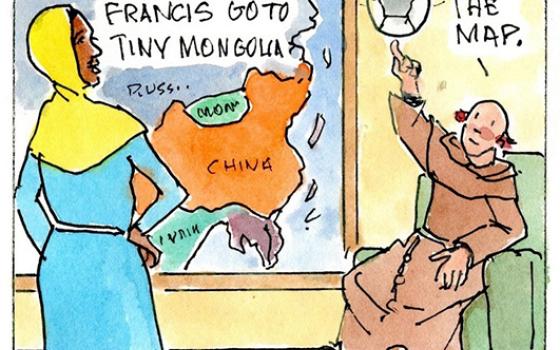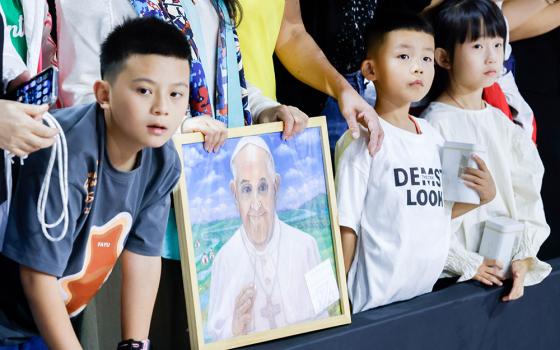Pope Francis answers questions from journalists aboard his flight back to Rome from Ulaanbaatar, Mongolia, Sept. 4, 2023, after a four-day visit to the Asian country. (CNS photo/Lola Gomez)
Pope Francis on Sept. 4 said that next month's hotly anticipated Synod of Bishops will be open to the Holy Spirit — but not so much the press or the public.
"This is not a television program where we can talk about everything," said the pope.
Francis' remarks came during an inflight press conference back to Rome after a four-day stay in Mongolia, and exactly four weeks before he is set to officially open the high-stakes, monthlong Vatican meeting where a number of controversial issues facing the Catholic Church in the modern world will be discussed by Catholic bishops and lay representatives.
The pope's remarks seemed to go against a number of efforts by Vatican officials, including those involved in organizing the synod, to make the October meeting a more open and transparent gathering than past proceedings, with even the possibility of having livestreamed broadcasts for as many of the sessions as possible.
Francis, who has previously expressed frustration that synods before his papacy were too tightly controlled, told reporters that the religious character of the gathering must be preserved, in an apparent sign that the pope is not willing to overhaul the standard operating procedures of this closely watched synod.
Francis said a commission chaired by the head of the Vatican's communication's office, Paolo Ruffini, will provide daily press releases about the major themes under discussion and noted that during the meeting, delegates would speak "freely" for several minutes at a time, followed by a pause for collective reflection, followed by prayer.
"Without this prayer, it's politics," said the pope.
Among the topics expected to be debated are a number of sensitive issues concerning the future of the church and its structures — including the role of women in church leadership, ministry to LGBTQ Catholics, access to the priesthood for married men and clergy sexual abuse.
The pope said the work of the synod's communication's commission would be "very respectful" and "will try to be truthful," adding that "it won't do gossip."
"It is very open," the pope insisted. "Don't forget the protagonist of the synod is the Holy Spirit."
When asked about recent criticisms of the synod, particularly by traditionalist U.S. Cardinal Raymond Burke, that have warned that the process will overhaul church doctrine, Francis dismissed those concerns, warning that doctrine can never become an ideology.
"Detaching from the journey of communion is ideology," the pope warned.
Pope Francis answers questions from journalists aboard his flight back to Rome from Ulaanbaatar, Mongolia, Sept. 4, 2023. (CNS photo/Lola Gomez)
Francis spoke to reporters aboard the papal flight for just under 40 minutes. Among the subjects discussed, the pope directly addressed questions about both Russian and China — Mongolia's two neighbors, both of whom have strained relations with the Vatican and were two countries that loomed large over the pope's visit.
In 2018, the Holy See entered into a controversial agreement with China over the appointment of Catholic bishops in the country.
Despite two recent violations of the agreement, Francis characterized the process as a "friendly" one and described the Chinese people as "very open," highlighting the fact that Catholic priests and intellectuals have been invited to teach in Chinese university.
Francis said the "religious aspect" of the relationship must be deepened so that "Chinese citizens do not think that the church does not accept their cultures and their values and that the church does not represent another foreign power."
The pope's comments echoed remarks he made earlier during his time in Mongolia that countries have nothing to fear from the practice of religion.
Pope Francis waves as people behind him raise a Chinese flag before the pope's Mass in Steppe Arena in Ulaanbaatar, Mongolia, Sept. 3, 2023. (CNS photo/Vatican Media)
Francis also sought to further clarify recent comments he made to Russian students that sparked an uproar over his apparent praise for Russia's imperialist past.
"Never forget your inheritance. You are the heirs of the great Russia. The great Russia of the saints, of the kings, of the great Russia of Peter the Great, of Catherine II, that great imperial Russia," the pope said during a video conference on Aug. 25.
"Maybe it isn't right what I said, but those are the things that came to mind," Francis clarified in the press conference, adding he was primarily thinking of the art and literature that he had studied in school
The pope said he was trying to encourage the young Russians to take ownership of their heritage, and that "Russian culture is so beautiful, so immensely profound, and it should not be cancelled due to political problems."
"Never imperialism, never," said Francis, "but always dialogue."
When asked about his recent announcement that on Oct. 4 he will publish an update to his landmark 2015 environmental encyclical Laudato Si': On Care for Our Common Home, the pope said that while he doesn't "go to the extremes" of some young environmental activists, he appreciates that young people are always thinking about the future.
Francis said that the original encyclical was released on the eve of the 2015 United Nations Climate Change Conference in Paris, which he said represented great progress towards collective environmental action.
But, he added, "there are things that have not been resolved" and that his forthcoming exhortation will offer an analysis of the current situation and will be shorter than the original 2015 encyclical.
Advertisement
During the 10-hour flight back to Rome, the 86-year-old Francis also acknowledged that traveling is "not as easy as at the beginning" of his papacy and that he has many limitations that now make planning international trips difficult.
When asked about the possibility of a papal visit to Vietnam — no pope has ever visited there and many Vietnamese Catholics traveled to Mongolia to join in the papal activities — Francis praised the recent progress in relations between the Holy See and Vietnam. Earlier this summer, it was announced that the Vatican would soon be allowed to set up a permanent diplomatic office in the country.
"If not me, then surely John XXIV" will visit, the pope said, using a hypothetical name for his successor.
Despite his age and travel difficulties, later this month, Francis will undertake another international journey — the 44th of his decade-long papacy — to Marseilles, France, for an overnight visit to take part in a meeting of Mediterranean-area Catholic bishops on migration issues.





